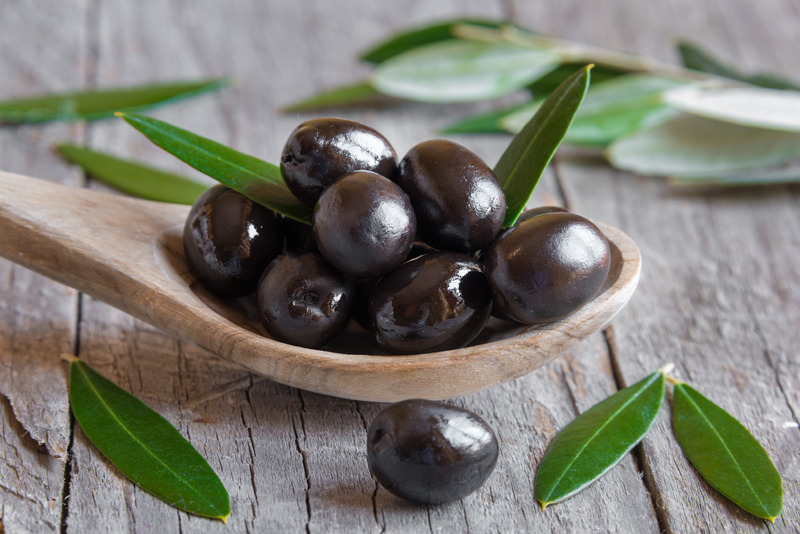Black olives: nutrition facts & data
|
Nutrition facts per 100g |
Black olives |
avg Fruit and fruit products[1]
|
|---|---|---|
| Calories (kcal) | 199.0 | 86.1 |
| Fat (g) | 17.0 | 0.8 |
| Protein (g) | 2.0 | 0.9 |
| Carbohydrates (g) | 4.0 | 16.3 |
| Mono- & Di-Saccharides (g) | 0.0 | 16.3 |
| Polysaccharides (g) | 4.0 | 16.3 |
| Fibers (g) | 7.0 | 2.7 |
| Sodium (mg) | 3,100.0 | 56.4 |
| Water (g) | 62.0 | 75.5 |
Breakdown in percent (%) of total calories
An average portion size (25g) of Black olives contain:
- 49.8 Calories
- 4.3g of Fat
- 0.5g of Protein
- and 1.0g of Carbs
- 775.0mg of sodium - 0.5% of the RDA for sodium.
- 5.0mg of Magnesium, that covers 0.0% of the recommended daily allowance (RDA) for Magnesium.
- 0.1mg of Zinc - 0.0% of the RDA for Zinc.
- 0.6mg of Iron - 0.0% of the RDA for Iron.
- 10.0mg of Potassium - 0.0% of the RDA for Potassium.
- No Vitamin C
- No Vitamin B12
For every gram of carbs in Black olives you get
- 0.50 grams of protein compared to the average of 0.46g per gram of carbs among all foods. Other foods in Fruit and fruit products have on average 0.06g of proteins per 1 gram of carbs.
- 4.25 grams of fat (total average 0.66g, other foods in Fruit and fruit products 0.05g)
- 1.75 grams of fibers (total average 0.13g, other foods in Fruit and fruit products 0.17g)
Nutrient distribution per gram
What vitamins are in Black olives?
|
Vitamins per 100g |
Black olives |
avg[1]
|
|---|---|---|
| Vitamin C (mg) | 0.0 | 44.5 |
| Vitamin E (mg) | 0.9 | 0.6 |
| Vitamin B1 / Thiamine (mg) | 0.0 | 0.0 |
| Vitamin B2 (mg) | 0.1 | 0.1 |
| Vitamin B6 (mg) | 0.0 | 0.1 |
| Vitamin B9 / Folate (μg) | 45.0 | 15.3 |
| Vitamin B12 (μg) | 0.0 | 0.0 |
| Retinol (μg) | 0.0 | 4.0 |
| beta-Carotene (μg) | 70.0 |
Are Black olives rich in vitamins?
The following chart displays the amount of vitamins per portion Size (25g) for Black olives of the recommended daily allowance (RDA[1]) for each vitamin in percent.
Learn more about RDA values for vitamins by clicking on the names in the table above.
Minerals in Black olives
|
Minerals per 100g |
Black olives |
avg[1]
|
|---|---|---|
| Magnesium (mg) | 20.0 | 17.4 |
| Zinc (mg) | 0.2 | 0.2 |
| Sodium (mg) | 3,100.0 | 56.4 |
| Calcium (mg) | 150.0 | 22.5 |
| Iron (mg) | 2.3 | 0.7 |
| Potassium (mg) | 40.0 | 224.3 |
| Phosphorus (mg) | 50.0 | 25.7 |
Are Black olives high in minerals?
Again, for every mineral contained in Black olives we looked at the portion size (25g) and applied it to the recommended daily allowance (RDA[1]). Data is shown in percent of RDA per portion size.
Learn more about RDA values for minerals by clicking on the names in the table above.
Carbohydrates in Black olives
4.0% of Black olives are carbs, per serving of 25g that makes 1.0g of carbs.
Monosachharides and polysaccharides
|
Sugars per 100g |
Black olives |
avg[1]
|
|---|---|---|
| Monosaccharides (g) | 0.0 | 15.9 |
| Polysaccharides (g) | 4.0 | 0.3 |
| Total carbs (g) | 4.0 | 16.3 |
How high are the Glycemic Index and the Glycemic Load for Black olives?
The Glycemic Index of Black olives is 15, which would be considered as low. The Glycemic Load in a normal serving is 0.2 and can be regarded as low.
Allergens in Black olives
- are Gluten free
- have no Lactose
- low amounts of Fructose
Fatty acids and cholesterol in Black olives
Of the 17.0g total fat per 100g in Black olives, 2.6g are saturated fatty acids (SFA), 1.6g are monounsaturated fatty acids (MUFA) and 12.4g are polyunsaturated fatty acids (PUFA). The amount of cholesterol is 0.0mg.

